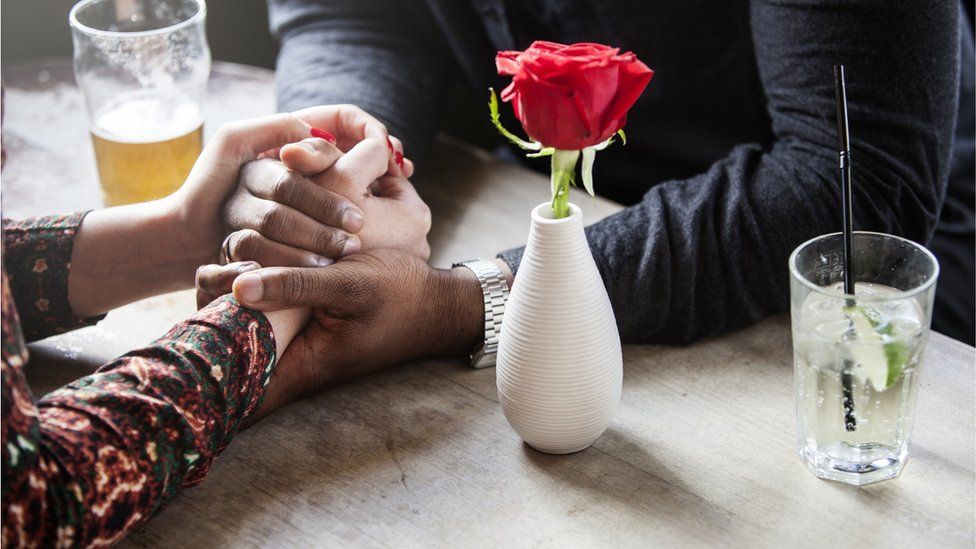
Daters are looking for “an instant spark”, relationship coach Fahima Mahomed says
By Noor Nanji
Culture reporter
A first date. Time to kick back, enjoy getting to know someone, maybe have a couple of glasses of wine…
Or not. If you’re like 24-year-old Zoe, you’ll be cutting things off early if you don’t feel there’s a spark.
In the past she would’ve stayed for at least two drinks “out of politeness”. But now, she doesn’t want to waste time and money on dates if she’s unsure.
She’s one of many single people who have become “more ruthless” about their love lives, says research firm Opinium.
Opinium says financial worries are a big reason for that. With money tight, it’s understandable if daters don’t want to spend their hard-earned cash on someone they might never see again.
But daters also “don’t have the patience they used to,” says TV host and relationship coach Fahima Mahomed.
“Single people nowadays want an instant spark, instant gratification, in the same way they’re used to getting their needs met instantly through websites like Amazon.
“If they don’t get that immediately, they cut things off,” she told the BBC.
Zoe now ends dates early if they’re not going well
Dating is an investment of time as well as money.
Zoe, who lives between Somerset and London, says she has less of both these days.
She recently went on a first date with a man she’s met on a dating app. But she left early as she felt there was no chemistry, and she didn’t want to waste her time.
When she goes on dates these days, she chooses activities such as drinks, rather than dinner – where you could be “stuck with them” for long periods of time.
“I’d never do dinner on a first date anymore,” she says. “You end up spending an extortionate amount of time and money on someone you might never see again.”
Opinium, which surveyed almost 4,000 UK adults on how their dating habits have changed since before the rising cost of living, found that these are common concerns.
Almost half (47%) of people surveyed in the poll said they were more likely to end things with someone early because they don’t want to waste money on dates if they’re unsure.
Image source, Getty Images
Love is in the air, but dating can be costly
Young people were even more likely to say that, with the percentage rising to 56% of Gen-Z respondents – those born between 1996 and 2010.
“As costs rise, singles across the country are becoming more ruthless when it comes to their love lives, with many taking precautionary measures to ensure they don’t overspend,” said Kate Jalie, director and partner at Opinium.
Mahomed says another reason why single people might be more cut-throat could be due to the lingering effects of the pandemic.
“There’s that fear of having wasted one or two of your prime years, sitting at home during the lockdowns, unable to meet anyone,” she said.
“So single people are now in more of a hurry, more quick to jump from one person to another, as they try to find a match.”
Dating apps have also observed the trend.
Bumble’s sex and relationships expert, Dr Caroline West, told BBC News: “With economic pressures and rising costs, it’s no surprise that many are rethinking their dating habits – often with a pragmatic approach.”
“While some may call it ruthless, it’s really about prioritising time and resources to make meaningful connections.”
For those who are in committed relationships, things aren’t necessarily easier.
The Times recently reported on the “couplepause” – a new name for the slump in sex experienced by some middle-aged couples, which is often blamed on financial stress.
‘Stripping it back to basics’
Dating culture has shifted a lot in recent years, says Married at First Sight (MAFS) dating coach Mel Schilling.
“The first was the pandemic, where we were all locked down and people couldn’t meet. Now, this is the second wave,” she said, with single people making different decisions about how they date.
Schilling, who is a psychologist, has been a part of the MAFS cast since 2016, first in her home country Australia and later on the UK version of the show, which airs on E4.
She is one of three relationship experts on the UK show alongside Paul Brunson and Charlene Douglas.
Image source, Getty Images
Mel Schilling is one of three dating experts who match people together on Married at First Sight
But Schilling says the fact daters are making different choices – such as short coffee meet-ups, versus spending hours together having a meal.
“I think it’s a positive, especially for first dates,” she said.
Schilling said the new trends were “stripping dating back to basics” – two people meeting up to see if they have a spark and, if not, calling it a day.
“You’re gathering data on the other person,” she said. “My advice would be ‘don’t invest too heavily’.”
Opinium surveyed 3,998 UK adults for the BBC between December 12 and 15, 2023.








